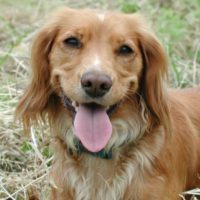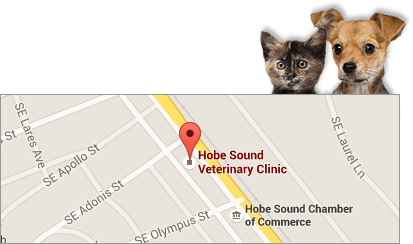Just like you, your dog sneezes sometimes. Most often, it’s simply because small particles of dust, dirt, grass, or other materials make their way into the nasal passages—your dog uses their nose to explore the world, after all. But what happens if your dog sneezes frequently, or won’t stop sneezing?
Here are some of the most common reasons that dogs sneeze:
Play Sneezing
Did you know that most dogs sneeze when they’re playing? Whether your dog is playing with another canine or with a human, you’ll probably see them sneeze a few times. Experts believe this is your dog’s way of showing other dogs that their play is good-natured, rather than threatening. Watch out for the play-sneeze the next time your pooch gets riled up!
Allergies
Another common reason that dogs sneeze is because of allergies. Environmental allergens are the usual culprit. Things like pollen, dander, mold, dust and dust mites, dirt, and much more can cause symptoms like a runny nose, watery eyes, and—you guessed it—excessive sneezing. And even food allergies can cause sneezing, so your dog could be reacting to the protein source or things like soy or dairy in their diet.
Talk to your vet if you think your dog might be suffering from allergies. Allergy medication might be necessary for your pup to feel better.
Brachycephalic Airway Obstruction Syndrome (BAOS)
Brachycephalic dogs (those with squashed faces and bulging eyes like the Pekingese, French and English Bulldog, boxers, pugs, and the Boston terrier) are prone to breathing trouble thanks to their narrow nasal passages and unique airway structures. Symptoms of Brachycephalic Airway Obstruction Syndrome include wheezing, snorting, and sneezing. If you have a Brachycephalic dog, ask your vet what you can do to help your pet stay comfortable.
Reverse Sneezing
In addition to normal sneezes, dogs also “reverse sneeze” on occasion. This happens when a dog snorts air into their nose quickly, which sounds almost like a sneeze. It can be alarming, but it’s perfectly normal and nothing to worry about. It’s most common in smaller dogs, including Brachycephalic breeds.
Medical Issues
Of course, it’s possible that medical problems like kennel cough, respiratory infections, nasal mites, and much more could be the root cause of Fido’s sneezing. If you can’t determine another cause of your dog’s behavior, set up an appointment with your vet clinic.
Our Advice on Your Dog Won’t Stop Sneezing
Why do dogs sneeze when playing, and what does it signify?
Dogs sneeze during play as a communication tool, signaling to their playmates that their actions are playful and not aggressive. This phenomenon, known as “play sneezing,” is a natural part of canine behavior, helping to maintain a friendly atmosphere during playtime. It’s widespread when dogs engage in rough-and-tumble play or are excited. Play sneezing is a clear cue to other dogs (and observant owners) that despite potentially rough play, the intent is purely social and benign, ensuring interactions remain positive and misunderstandings are minimized.
What steps should a dog owner take if they suspect allergies cause their dog’s sneezing?
Suppose a dog owner suspects their pet’s sneezing is due to allergies. In that case, the first step is to consult a veterinarian for a thorough examination and potential allergy testing to identify the specific allergens. The vet may recommend avoiding known triggers, such as some outdoor regions during high pollen seasons, and may prescribe antihistamines or other medications to manage symptoms. Additionally, implementing air purifiers at home and regular bathing to remove allergens from the dog’s fur can be beneficial. Dietary changes might also be advised if food allergies are suspected. Following a vet’s guidance is crucial for effectively managing a dog’s allergic reactions.
What is Brachycephalic Airway Obstruction Syndrome (BAOS), and which breeds are most affected?
Brachycephalic Airway Obstruction Syndrome (BAOS) affects dogs with short skulls and flat faces, leading to narrowed nostrils and elongated soft palates. This anatomical structure causes breathing difficulties, snoring, and, in severe cases, life-threatening obstruction. Breeds most commonly affected include Bulldogs (English and French), Pugs, Boston Terriers, Pekingese, Boxers, and Shih Tzus. Treatment varies from lifestyle adjustments to surgical interventions to improve airway flow. Early veterinary assessment is crucial for managing symptoms and preventing complications, ensuring affected dogs maintain a good quality of life.
What is reverse sneezing, and why is it not usually a cause for concern?
Reverse sneezing, or pharyngeal gag reflex, is common in dogs that rapidly inhale air through the nose, producing a distinctive snorting sound. It’s often triggered by irritation of the throat or soft palate. While it may sound alarming, reverse sneezing is generally not a cause for concern. It’s usually brief and self-resolving, without any adverse health effects. However, if episodes are frequent or accompanied by other symptoms like nasal discharge or difficulty breathing, a veterinary consultation is advised to rule out underlying conditions.
What medical issues might cause a dog to sneeze excessively, and when should a vet be consulted?
Excessive sneezing in dogs can be caused by various medical issues, including allergies, nasal mites, foreign bodies lodged in the nasal passages, dental problems, and respiratory infections. More serious conditions like nasal tumors may also be the culprit. A vet consultation is recommended if the sneezing is persistent, accompanied by bloody or colored discharge, or if the dog exhibits other symptoms like difficulty breathing, lethargy, or reduced appetite. Early diagnosis and treatment are crucial for addressing the underlying cause and preventing further complications.
Contact your local vet clinic in Hobe Sound, FL for more information on your dog’s sneezing.




